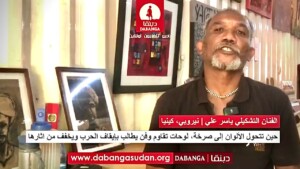Sudanese emphasise the importance of local and indigenous cultures
The town of Delling in South Kordofan witnessed the closure of the harvest festival on Saturday. Events included folk exhibitions, dances and wrestling, drawing crowds from both urban and rural areas.
 Farmers in Delling celebrate the end of the harvest (social media)
Farmers in Delling celebrate the end of the harvest (social media)
The town of Delling in South Kordofan witnessed the closure of the harvest festival on Saturday. Events included folk exhibitions, dances and wrestling, drawing crowds from both urban and rural areas.
Suleiman Jabraldar, chief of the Delling tribe, told Radio Dabanga that such harvest festivals are important economic and social events for the people of the region. He explained that, in the past, social solidarity in the community was achieved by helping poor families with their crop and food provision.
Jabraldar also explained that the folk traditions in the region have undergone great changes due to urbanisation and exchange with other cultures. He indicated that many values and popular legacies have disappeared among communities in the region.
"Most of the youth are not familiar with their folk customs and traditions, especially languages", said Jabraldar. He stressed the need for all societies in Sudan to adhere to, and preserve, their local cultures.
Eastern Sudanese culture
Similarly, Jaafar Dereif, an activist interested in the Beja heritage in eastern Sudan, praised the cultural richness of the eastern region. He told Radio Dabanga in its programme on youth issues that people in eastern Sudan, especially young people, are still clinging to their own customs and traditions despite their interactions with other societies and cultures.
He referred to popular forms of dressing characteristic of eastern Sudan along with other traditions, such as drinking coffee and the hoseib (a traditional dance).
Dereif praised the social cohesion of different groups in eastern Sudan and believes this solidarity is the result of the interaction and exchange between different cultures from all parts of Sudan in this region.
He referenced the fact that a large number of non-native speakers have learned and mastered eastern Sudanese languages, especially those who received education at the Beja Studies Centre from the Red Sea University.
Cultural heritage festivals
One form of celebration of indigenous cultures and highlight their importance is cultural heritage festivals. In 2015, Radio Dabanga reported on The Nuba Mountains Cultural Heritage Festival that took place in Khartoum to mark the International Day of the World's Indigenous Peoples. Hundreds of members of the Nuba community came to the Sudanese capital Khartoum to dance and sing in a festival that showcased their culture.
Radio Dabanga’s editorial independence means that we can continue to provide factual updates about political developments to Sudanese and international actors, educate people about how to avoid outbreaks of infectious diseases, and provide a window to the world for those in all corners of Sudan. Support Radio Dabanga for as little as €2.50, the equivalent of a cup of coffee.












 and then
and then